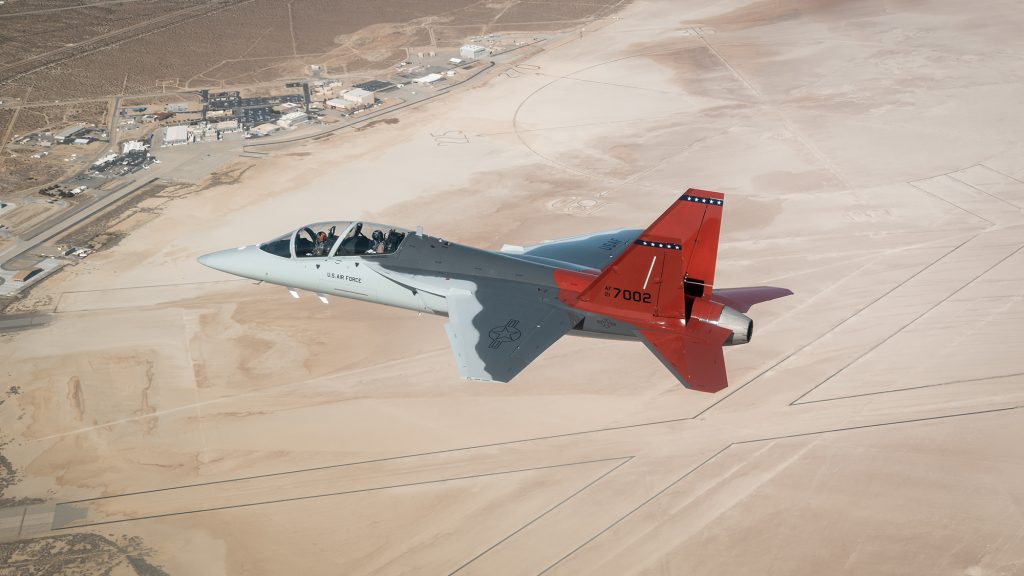Boeing’s Defense, Space & Security division (BDS) recorded its smallest loss of the year in the fourth quarter of 2023, as the aerospace giant works back toward profitability in the 2025-2026 timeframe, Boeing officials said Jan. 31.
BDS lost a net $101 million in the final three months of 2023, driven by losses of $139 million on three fixed-price programs that were not identified. Although this performance was worse than expected, Boeing executive vice president and chief financial officer Brian West said the company aims to get back to “historical” levels of performance in the next two or three years.
The unit has collectively logged billions of dollars in losses on the KC-46 tanker, T-7 trainer, VC-25B Air Force One, and MQ-25 uncrewed tanker programs in the last decade, with nearly $1 billion of that in 2023 alone.
In the latest quarter, though, BDS’ revenue gained nine percent on the strength of the KC-46 Lot 10 award for 15 aircraft. Overall the unit delivered 52 aircraft and two satellites in the last quarter, West noted.
“Our game plan—to get BDS back to high single-digit margins by the ’25-’26 timeframe—remains unchanged,” he said, noting that the unit has a $59 billion backlog.
“Operational performance stabilized as we exited the year,” he said, and he reiterated the company’s pledge to be more disciplined in how it bids for new defense and space work. He suggested the worst effects of fixed-price program losses “are behind us,” but “we still have more work to do.”
Boeing still expects “to return to the strong historical performance levels as we roll in new contracts with tighter underwriting disciplines as we move into the ’25-‘26 timeframe,” West said.
Company president and CEO David Calhoun has previously said that Boeing’s zeal to win defense competitions in the last decade caused it to “accept too much risk” on fixed-price programs, leading to heavy losses amounting to over $7 billion on the KC-46 alone.
The fixed-price programs are “maturing” and represent “less of a drag” on profits, West noted.
“In addition to capturing the tanker award from the U.S. Air Force, the program delivered nine aircraft in the fourth quarter. [We] continue to build positive momentum in spite of the supplier-related disruptions to the factory that we faced earlier last year,” he asserted.
The first T-7 Red Hawk trainer has been delivered to Edwards Air Force Base to begin flight testing, he said, and the increasing deliveries on Boeing programs show they have “momentum,” he added.

“Overall, the defense portfolio is poised to improve the strong demand across the customer base,” West said. “The products are performing … and we’re confident that our efforts to drive execution and stability will turn this business to performance levels that our investors recognize.”
Apache attack helicopters, missiles, and weapons are all “things that are needed right now in this environment,” West said, leading to strong performance that has offset other losses in the division.
But the fighters and missiles business “has to get better,” West said.
Boeing Global Services saw a 3.5 percent uptick in margins mainly on the strength of contracts to sustain the C-17 airlifter.
Discussion of Boeing’s plans to recover from quality escapes that have grounded many of its 737 MAX airliners for safety concerns monopolized most of the earnings call. President and chief executive officer David Calhoun apologized to Alaska Airlines and all MAX-9 passengers and operators for quality problems that caused a door plug to blow out on a recent flight.
“I do believe the [FAA] investigation will wrap quickly,” Calhoun said, but “we simply must do better.” He insisted that safety is the company’s top priority and that Boeing will do everything it must to reassure its customers and the flying public of the integrity of the fleet.
